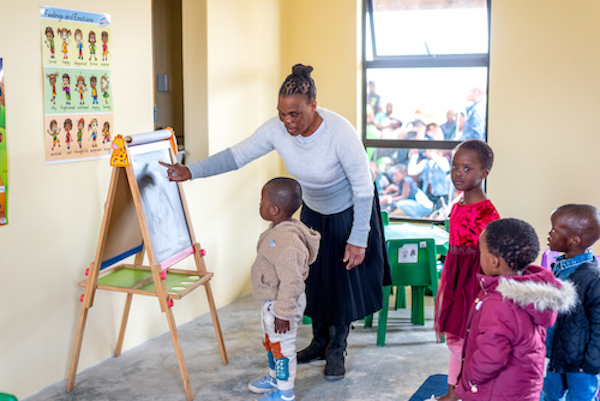Youth Month Sparks Urgent Call to Expand ECD Access
As South Africa marks Youth Month under the theme ‘Skills for the changing world – Empowering youth for meaningful economic participation’, a crucial truth demands more attention: the path to economic participation starts long before school, and we may already be failing children before they even enter a classroom.
“Over 1.3 million children are currently locked out of early childhood development (ECD) programmes that could break the poverty cycle,” says Deb Zelezniak, CEO of the Santa Shoebox Project. “South Africa is neglecting its youngest citizens at a critical stage of growth.”
While Government’s R10 billion allocation to ECD will raise the subsidy from R17 to R24 per child per day and expand access to an additional 700,000 children, she points out: “The current subsidy amount of R24 per child per day is not enough to cover the full cost of a basic quality ECD programme, which is estimated to be at least R36 per child per day. R24 a day is currently insufficient to deliver quality early learning, nutrition, and care, and will certainly not be able to meet the Department of Basic Education’s goal of universal ECD access by 2030.”
“The stakes are high,” explains Zelezniak. “Children who receive quality early education do better at school, are less likely to engage in crime, and are more likely to find meaningful employment. Every Rand invested in ECD returns around R7 in social and economic impact through better school performance, improved social cohesion, reduced inequality, and a more inclusive economy.”
“There are measurable differences between children with and without early intervention, and those gaps only grow wider over time. ECD is more than childcare, it’s economic justice and the foundation for a more equitable, prosperous South Africa. Without access to quality ECD, today’s 1.3 million excluded children risk becoming a generation left behind.”
About the Santa Shoebox Project
Traditional Santa Shoebox: Over the last 19 years, 1 301 508 Santa Shoeboxes, each containing eight specified items of treats and essentials, have been given to underprivileged and socially vulnerable children throughout South Africa and Namibia. From 01 September each year, Santa Shoebox donors choose their beneficiary child/ren by name, age and gender and are given the child’s clothing size. Each personalised shoebox reaches the very child for whom it was pledged.
Virtual Santa Shoebox: These shoeboxes are purchased online by donors and are available year-round, meeting the needs of donors who live too far from drop-off points, are too busy to shop or have health issues. Components are chosen by the donor on the Santa Shoebox website, the shoeboxes are packed by the Santa Shoebox Team and delivered to children attending far-flung rural facilities. A VSS contains the eight specified items, as well as additional items, such as a lunchbox and books, and costs R500 plus an optional delivery fee of R30.
SSP Legacy: All Santa Shoebox Project operating costs are covered by corporate sponsors. Privately donated funds and surplus funds generated by the sale of Virtual Santa Shoeboxes accrue to the SSP Legacy and are used to bring permanent change to the lives of Santa Shoebox beneficiary children and the impoverished communities in which they live. SSP Legacy initiatives have thus far reached more than 125 000 children.
Fiduciary information: As a Level One Contributor to B-BBEE, the Santa Shoebox Project earns 100 points on the generic scorecard, and with Section 18A status, is able to provide a tax-deductible receipt in recognition of donations. The Project is an initiative of the JOG Trust (IT2671/2009). The Trust is registered as a Public Benefit Organisation (PBO-930031301), a Non-Profit Organisation (NPO 102-098) and holds a current ICPR in support of 100% SED compliance.

